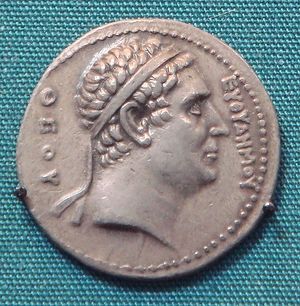Difference between revisions of "Euthydemus I"
Artaxerxes (talk | contribs) (Created page with "thumb '''Euthydemus I''' (ca. 260 f.Kr. - 200/195 f.Kr.), Greco-Bactrian king in about 230 or 223 BCE according to Polybius.[1], he is thought to have o...") |
Artaxerxes (talk | contribs) |
||
| Line 1: | Line 1: | ||
[[File:Euthydemus I.jpg|thumb]] | [[File:Euthydemus I.jpg|thumb]] | ||
| − | '''Euthydemus I''' (ca. 260 f.Kr. - 200/195 f.Kr.), | + | '''Euthydemus I''' (ca. 260 f.Kr. - 200/195 f.Kr.), gresk-baktrisk konge fra rundt 230 eller 223 f.Kr. i henhold til [[Polybius]]. Han antas å opprinnelig ha vært en Satrap av Sogdiana, som avsatte dynastiet til [[Diodotus I Soter]] og gjorde seg selv til konge. [[Strabo]] på sin side setter hans maktovertagelse i forbindelse med de borgerkrigene i [[Selevkide-riket]] 223-221 f.Kr. Hans kongerike synes å ha vært omfattende, og inkludert Sogdiana i nord, samt Margiana og Ariana sør eller øst for Baktria. |
| − | |||
| − | Euthydemus | + | Euthydemus skal ha kommet fra Magnesia, og var far til [[Demetrius I av Baktria]] i følge Strabo og Polybius. Han kan ha vært en etterkommer av [[Antimakos I]]. |
| − | + | Vi vet lite om hans regjeringstid før 208 f.Kr., da han ble angrepet av [[Antiokos III den store]], som han forgjeves forsøkte å stoppe ved elven Arius, vår tids Herirud. Han tapte slaget ved Arius til tross for at han hadde 10.000 ryttere, og måtte trekke seg tilbake. Han klarte imidlertid å motstå en beleiring av den befestede byen Baktra i tre år, til Antiokos bestemte seg for å anerkjenne ham, og ga en av sine døtre som hustru til Euthydemus' sønn Demetrius rundt 206 f.Kr. | |
| − | + | Etter at selevkide-hæren trakk seg tilbake ser det ut til at kongedømmet raskt kom på beina igjen, og i de siste årene av Euthydemus' liv ble den baktriske invasjonen av de nordvestlige delene av [[India]] sannsynligvis påbegynt, en invasjon som fortsatte under sønnen Demetrius. | |
| − | |||
| − | |||
| − | |||
| − | |||
| − | |||
| − | |||
| − | |||
[http://en.wikipedia.org/wiki/Euthydemus_I Wikiartikkel] | [http://en.wikipedia.org/wiki/Euthydemus_I Wikiartikkel] | ||
| Line 25: | Line 17: | ||
[[Category:Grekere]] | [[Category:Grekere]] | ||
[[Category:Afghanistan]] | [[Category:Afghanistan]] | ||
| + | [[Category:Historiske Fjes 200]] | ||
Revision as of 00:09, 19 November 2010
Euthydemus I (ca. 260 f.Kr. - 200/195 f.Kr.), gresk-baktrisk konge fra rundt 230 eller 223 f.Kr. i henhold til Polybius. Han antas å opprinnelig ha vært en Satrap av Sogdiana, som avsatte dynastiet til Diodotus I Soter og gjorde seg selv til konge. Strabo på sin side setter hans maktovertagelse i forbindelse med de borgerkrigene i Selevkide-riket 223-221 f.Kr. Hans kongerike synes å ha vært omfattende, og inkludert Sogdiana i nord, samt Margiana og Ariana sør eller øst for Baktria.
Euthydemus skal ha kommet fra Magnesia, og var far til Demetrius I av Baktria i følge Strabo og Polybius. Han kan ha vært en etterkommer av Antimakos I.
Vi vet lite om hans regjeringstid før 208 f.Kr., da han ble angrepet av Antiokos III den store, som han forgjeves forsøkte å stoppe ved elven Arius, vår tids Herirud. Han tapte slaget ved Arius til tross for at han hadde 10.000 ryttere, og måtte trekke seg tilbake. Han klarte imidlertid å motstå en beleiring av den befestede byen Baktra i tre år, til Antiokos bestemte seg for å anerkjenne ham, og ga en av sine døtre som hustru til Euthydemus' sønn Demetrius rundt 206 f.Kr.
Etter at selevkide-hæren trakk seg tilbake ser det ut til at kongedømmet raskt kom på beina igjen, og i de siste årene av Euthydemus' liv ble den baktriske invasjonen av de nordvestlige delene av India sannsynligvis påbegynt, en invasjon som fortsatte under sønnen Demetrius.
